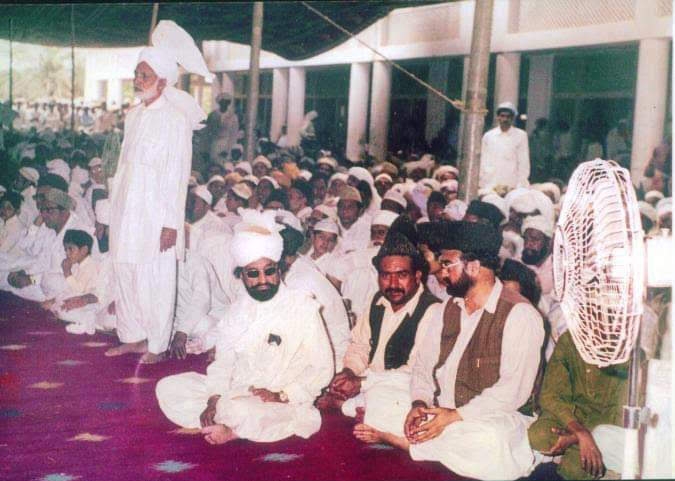Ghulam Mohiyuddin Gilani on:
[Wikipedia]
[Google]
[Amazon]
Peer
 He received his early education from Qari Abdul Rahman of Jawnpur and Maulana Muhammad Ghazi under the supervision of his father Peer Meher Ali Shah.
After completing his education, Ghulam Mohiyuddin received the caliphate (''
He received his early education from Qari Abdul Rahman of Jawnpur and Maulana Muhammad Ghazi under the supervision of his father Peer Meher Ali Shah.
After completing his education, Ghulam Mohiyuddin received the caliphate (''

 Ghulam Mohiyuddin died on 22 June 1974 after prolonged illness and was buried next to his father in Golra Sharif.
Ghulam Mohiyuddin died on 22 June 1974 after prolonged illness and was buried next to his father in Golra Sharif.
Syed
Syed may refer to:
* Seyd, alternative for Sayyid (name)
* Alternative for Sayyid, an honorific title
* Ahsan Ali Syed (born 1973), Indian businessman
* Ghulam Murtaza Syed (1904-1995), prominent Sindhi politician
* Ibrahim Bijli Syed (born 1939) ...
Ghulam Mohiyuddin Gilani (December 1891 - 22 June 1974), commonly called Babuji, was a Sufi scholar from Golra Sharif
Golra Sharif () is a town situated near the Margalla Hills in Islamabad Capital Territory, Pakistan, at about above sea level, from the ancient city of Taxila.
Before the arrival of the Peer family, including Peer Meher Ali Shah, the area ...
, Pakistan
Pakistan, officially the Islamic Republic of Pakistan, is a country in South Asia. It is the List of countries and dependencies by population, fifth-most populous country, with a population of over 241.5 million, having the Islam by country# ...
, belonging to the Chishti order
The Chishti order () is a Sufi Tariqa, order of Sunni Islam named after the town of Chishti Sharif District, Chisht, Afghanistan where it was initiated by Abu Ishaq Shami. The order was brought to Herat and later spread across South Asia by Mu ...
. He was the son of Peer Meher Ali Shah and served as the ''sajjada nashin
The ''Sajjāda Nashīn'' (; ) or ''Gaddi Nashin'' is a term of Persian origin, used chiefly within the Sufi traditions of South Asia referring to the successor or hereditary administrator of a Sufi master who typically functions as a custodian or ...
'' of the Golra Sharif shrine from 1937 to 1974.
Education
 He received his early education from Qari Abdul Rahman of Jawnpur and Maulana Muhammad Ghazi under the supervision of his father Peer Meher Ali Shah.
After completing his education, Ghulam Mohiyuddin received the caliphate (''
He received his early education from Qari Abdul Rahman of Jawnpur and Maulana Muhammad Ghazi under the supervision of his father Peer Meher Ali Shah.
After completing his education, Ghulam Mohiyuddin received the caliphate (''khilafat
A caliphate ( ) is an institution or public office under the leadership of an Islamic steward with the title of caliph (; , ), a person considered a political–religious successor to the Islamic prophet Muhammad and a leader of the entir ...
'') from his father but was not prepared to take anyone as his ''murid
In Sufism, a (Arabic ) is a novice committed to spiritual enlightenment by (traversing a path) under a spiritual guide, who may take the title , or . A or Sufi follower only becomes a when he makes a pledge () to a . The equivalent Pers ...
'' (spiritual disciple) mainly due to his claim that he did not possess the merit that is required for extending bay'ah to others. Only after his father Meher Ali Shah assured that, “I agree to be responsible for anyone who takes bai'at at your hand.”, he started taking people as his murid.
Beliefs
Following the example of his father, Ghulam Mohiyuddin was a firm adherent to the concept of Ibn Arabi's ideology of "Wahdat-ul-Wajood" (Ultimate Unity of Being). According to him, the Divine Will is at work behind all that is happening in the universe. The Divine Will which is absolute and everlasting manifests itself in the diverse aspects of this universe. Ghulam Mohiyuddin was also a firm admirer ofJalāl ad-Dīn Muhammad Rūmī
Jalāl al-Dīn Muḥammad Rūmī (), or simply Rumi (30 September 1207 – 17 December 1273), was a 13th-century poet, Hanafi '' faqih'' (jurist), Maturidi theologian (''mutakallim''), and Sufi mystic born during the Khwarazmian Empire ...
so much so that he is reported to have made his qawwal i.e; the person who performs Qawwali
Qawwali is a form of Sufi Islamic devotional singing originating in the Indian subcontinent. Originally performed at Sufi shrines throughout the Indian subcontinent, it is famous throughout Pakistan, India, Bangladesh and Afghanistan and has ...
, memorize almost half of the Masnavi
The ''Masnavi'', or ''Masnavi-ye-Ma'navi'' (, DIN 31635, DMG: ''Mas̲navī-e maʻnavī''), also written ''Mathnawi'', or ''Mathnavi'', is an extensive poem written in Persian language, Persian by Jalal al-Din Muhammad Rumi, also known as Rumi. I ...
which was then performed at the shrine. His biography states that he would sometimes refer to Rumi as “Pir-e-Ma” (mine guide).

Political activity
Ghulam Mohiyuddin supported thePakistan Movement
The Pakistan Movement was a religiopolitical and social movement that emerged in the early 20th century as part of a campaign that advocated the creation of an Islamic state in parts of what was then British Raj. It was rooted in the two-nation the ...
, encouraging the mass displacement of the population around the time of the Partition of India
The partition of India in 1947 was the division of British India into two independent dominion states, the Dominion of India, Union of India and Dominion of Pakistan. The Union of India is today the Republic of India, and the Dominion of Paki ...
.
Death
References
{{DEFAULTSORT:Syed Ghulam Mohiyyuddin Gilani 1891 births 1974 deaths Chishtis 20th-century Pakistani philosophers Pakistani Sufi religious leaders People from British India Punjabi Sufis Writers from Islamabad People from Punjab Province (British India)